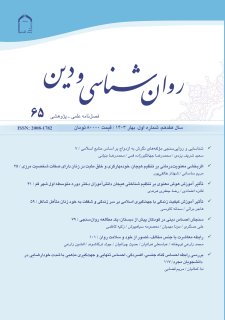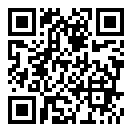سنجش احساس دینی در کودکان پیش از دبستان: یک مطالعه روانسنجی
Article data in English (انگلیسی)
- تهذیبی، نسرین و امیر جوادنیا، 1385، «تربیت دینی کودکان در دوره پیش از دبستان»، نشریه پیوند، ش 319، ص 27-35.
- جان بزرگی، مسعود و دیگران، 1391، آموزش اخلاق، رفتار اجتماعی و قانون پذیری به کودکان، تهران، ارجمند.
- شهبازیزاده، فاطمه، 1383، بررسی رابطه بین ادراک سبک دلبستگی دوران کودکی و سبک دلبستگی بزرگسال با سبک دلبستگی به خدا، پایاننامه کارشناسی ارشد، دانشگاه شهید بهشتی.
- عسگری، علی، 1387، «رویآوردهای نوین در روانسنجی(قسمت سوم) مدلهای نظریه سؤال-پاسخ، مدل راش»، روانشناسی تحولی (روانشناسان ایرانی)، ش 3، ص 80- 83.
- عسگری، علی و دیگران، 1400، مطالعه کودکی در ایران، موج دوم، گزارش پژوهش، تهران، مؤسسة همنوای آوای رویش.
- نوذری، مرضیه و بابک شمشیری، 1390، «آسیبهای تربیت دینیِ کودکان مقطع پیشدبستانی از نظر متخصصان علوم تربیتی، روانشناسی، علوم دینی، ادبیات کودک و مربیان پیشدبستانی»، تربیت اسلامی، ش 12، ص 51-73.
- نوذری، مرضیه و بابک شمشیری، 1397، تربیت دینی کودکان پیشدبستانی، تهران، آوای نور.
- نوذری، محمود، 1388، «توصیف و ارزیابی رویکرد شناختی رشد دینی»، اسلام و پژوهشهای تربیتی، ش 2، ص 139-168.
- نوذری، محمود، 1390، «آموزش دین در دوره کودکی: ارزیابی انتقادی رویکرد روانشناختی»، تربیت اسلامی، ش 6، ص173- 192.
- هومن، حیدرعلی، 1380، مدلسازی معادلات ساختاری، تهران، سمت.
- هومن، حیدرعلی، 1389، اندازهگیریهای روانی تربیتی فن تهیه تست، تهران، پیک فرهنگ.
- Bartkowski, J. P, et al, 2019, "Mixed Blessing: The Beneficial and Detrimental Effects of Religion on Child Development among Third-Graders", Religions, No. 10 (1), 37, https:// doi.org/ 10.3390/rel10010037
- Bentler, P.M, 1990, "Comparative Fit Indexes in Structural Models", Psychological Bulletin, No. 107, p. 238–246.
- Bentler, P.M,1993, A Structural Equation Program, BMDP Statistical Software, Inc, Version 4.02 (c).
- Berry, J. W, 1989, "Imposed Etics-Emics-Derived Etics: The Operationalization of a Compelling Idea", International Journal of Psychology, No. 24, p. 721-735.
- Berry, J. W, 1997, "Immigration, acculturation and adaptation", Applied Psychology: An International Review, No. 46, p. 5-61.
- Boyatzis, S, 2006, The Handbook of Spiritual Development in Childhood and Adolescence, SAGE Publications, Inc.
- Browne, M. W, & Cudeck, R, 1993, "Alternative ways of assessing model fit", In: K. A. Bollen and J. S. Long (Eds.), Testing structural equation models, p. 136-162.
- Byrne, B. M, 1989, A Primer of LISREL Basic Applications and Programming for Confirmatory Factor Analytic Models, New York Springer-Verlag.
- DeMars, C, 2010, Item Response Theory, Oxford University Press, Inc.
- Gallup, G, & Bezilla, R, 1992, The Religious life of young Americans: A compendium of surveys on the spiritual beliefs and practices of teen-agers and young adults, G.H. Gallup International Institute.
- Granqvist, P, & Kirkpatrick, L. A, 2004, "Religious conversion and perceived childhood attachment: A meta-analysis", International Journal for the Psychology of Religion, No. 14, p. 223–250.
- Hui, C. H, & Triandis, H.C,1985, "Measurement in cross-cultural psychology. A review and comparison of strategies", Journal of Cross-cultural Psychology, No. 16, p. 131-152.
- Kiessling, F, & Perner, J,2014, "God–mother–baby: What children think they know", Child Development, No. 85, p. 1601–1616.
- Kim, S, 2021, "Development and Validation of a Faith Scale for Young Children", Religions, No. 12(3), 197, https://doi.org/10.3390/rel12030197
- Kowalczyk, S, 2011, Człowiek w poszukiwaniu wartości [People in search of val- ues], Lublin: Wydawnictwo KUL.
- Krok D, 2018, "Examining the role of religion in a family setting: religious attitudes and quality of life among parents and their adolescent children", Journal of Family Studies, No. 24(3), p. 203–218.
- Linacre, J.M, 2006, WINSTEPS Rasch measurement computer program, Chicago: Winsteps.com.
- Mahoney, J.L, et al, 2003, "Promoting Interpersonal Competence and Educational Success Through Extracurricular Activity Participation", Journal of Educational Psychology, No. 95(2), p. 409–418, https://doi.org/10.1037/0022-0663.95.2.409
- Małgorzata, T. & Mańkowska, M, 2015, "Religious feelings in pre-school children in their own and their mothers’ perception", Journal for Perspectives of Economic Political and Social Integration, No. 21(1-2), p. 15-33.
- Milevsky, I. M, et al, 2008, "Transmission of religious beliefs in college students", Mental Health, Religion & Culture, No. 11(4), p. 423–434.
- Nnadozie E.E, et al, 2018, "Parenting style and religiosity as predictors of antisocial behavior among Nigerian Undergraduates", Journal of Social Service Research, No. 44(5), p. 624–631.
- Riany Y.E, 2017, "Understanding the influence of traditional cultural values on Indonesian parenting", Marriage & Family Review, No. 53(3), p. 207–226.
- Richert, R. A, & Barrett, J. L, 2005, "Do you see what I see? Young children’s assumptions about God’s perceptual abilities", The International Journal for the Psychology of Religion, No. 1, p. 283–295.
- Richert, R. A, et al, 2016, "The role of religious context in children's differentiation between God's mind and human minds", British Journal of Developmental Psychology, No. 35(1), p. 37-59.
- Smith Jr, E.V, 2000, "Evidence for the Reliability of Measures and Validity of Measure Interpretation: A Rasch Measurement Perspective", Journal of Applied Measurement, No. 3, p. 281-311.
- Tamminen, K, 1994, "Religious experiences in childhood and adolescence: a viewpoint of religious Development between the ages of 7 and 20", International Journal for the Psychology of Religion, No. 4(2), p. 61-85.
- Tenenhaus, M, et al, 2005, "Pls path modeling", Computational statistics & data analysis, No. 48(1), p. 159–205.
- Tate, R, 2003, "A comparison of selected empirical methods for assessing the structure of responses to test items", Applied Psychological Measurement, No. 27, p. 159–203.
- Tyng, C. M, 2017, "The Influences of Emotion on Learning and Memory", Frontiers in Psychology, No. 24(8) ,1454, doi:10.3389/fpsyg.2017.01454
- Volling B.L, et al,2009, "Sanctification of parenting, moral socialization, and young children’s conscience development", Psychology of Religion and Spirituality, No. 1, p. 53–68.
- Williams P.D, et al, 2019, "Religious / spiritual struggles and perceived parenting style in a religious college-aged sample", Mental Health, Religion & Culture, No. 22(5), p. 500-516, https://doi.org/10.1080/13674676.2019.1629402







